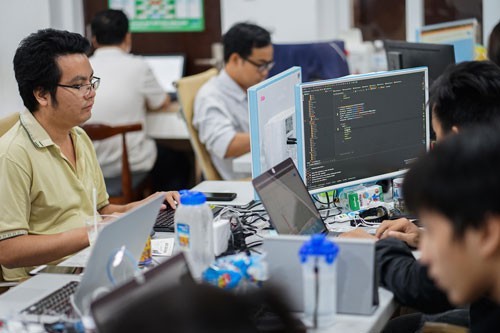
Opportunities
Nguyen Cong Ai, deputy CEO of KPMG Vietnam, which provides financial consultancy services, said that Vietnamese enterprises were increasing investments in technology, including digital transformation and cyber security.
The market is witnessing a race for human resources in the IT industry. The number of qualified IT workers is limited, and many of them work for foreign companies. KPMG, a foreign company, has even lost good engineers to other foreign firms.
Tran Phuc Hong, deputy CEO of TMA Software, deputy chair of VNITO Alliance, commented that innovation is mentioned as a trend but there are very few successful businesses in the field.
To develop well, businesses need to choose the right path. For example, they could invite experts on innovation to Vietnam to share views about how to move from ideas to production processes.
By targeting the right markets and offering the right products, the company has provided software apps to collect information about epidemics to 60 countries, and created software that supports the solution of releasing mosquitoes to stop the spread of dengue fever in 12 countries.
The participants at the 2019 conference on developing IT services themed ‘Vietnam, a destination for innovation’ held by VNITO Alliance several days ago heard about a Vietnamese firm that uses AI to rate the severity of calls and filter spam calls to the US market. Algorithms for programming time-saving and cleaning and washing have also been transferred by Vietnamese technology firms to US and European markets.
HCM City needs help
Vietnam in general and HCM City in particular want to change the structure of exports, focusing on exporting technology and services. Pham Phu Quoc, deputy head of the HCM City Institute for Development Studies, said that electronics, textiles and garments, and footwear remain the major exports of the city, making up 60 percent of total exports.
However, it is difficult to immediately increase the proportion of software exports.
Software solutions to serve domestic needs can be built, but in exports Vietnamese technology firms mostly do outsourcing, work that brings low added value.
Quoc said policies are needed to encourage Vietnamese firms to boost the export of technological solutions, including increasing IT workforce, encouraging firms to export software, and helping businesses minimize difficulties in the first phases of operation.
Software solutions to serve domestic needs can be built, but in exports Vietnamese technology firms mostly do outsourcing, work that brings low added value.
Quoc said policies are needed to encourage Vietnamese firms to boost the export of technological solutions, including increasing IT workforce, encouraging firms to export software, and helping businesses minimize difficulties in the first phases of operation.
